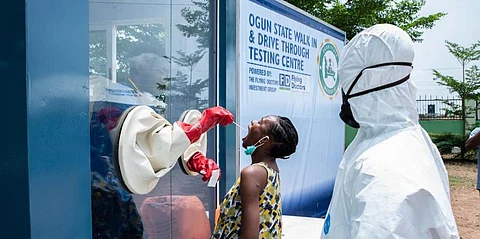

A year into the novel coronavirus disease (COVID-19) pandemic, data has painted an unexpected picture about the behaviour of SARS-CoV-2 in Africa. It was believed that because of a weak health system, the continent would not be able to deal with the pandemic.
However, as of April 8, 2021 only a little more than 3,221 cases per million have been reported in Africa, compared to 17,183 cases per million reported globally. In case of deaths, Africa has reported 85.7 deaths per million compared to 372.3 deaths per million globally.
One reason for this is that the population is young. Some 40 per cent of the continent’s population is younger than 14 years. Globally, most deaths have been seen in people above the age of 65 years.
“The elderly tend to move to the rural areas once they retire. These areas are less densely populated hence there is lower risk of contracting the disease than in more developed countries where the elderly are in specialised centers such as retirement homes,” Borna Nyaoke-Anoke, senior clinical project manager at Drugs for Neglected Diseases initiative, Nairobi, Kenya, said.
In the absence of road networks, the disease has not spread to rural areas. There is little local transmission as most activities in rural areas occur outdoors. “We know the virus transmits better indoors and that crowding and close contact (which is more common in urban areas) are risk factors for infection,” Francisca Mutapi, professor in Global Health Infection and Immunity at the University of Edinburgh and deputy director of Tackling Infections to Benefit Africa partnership, said.
A study published June 1, 2020 in the American Journal of Tropical Medicine and Hygiene analysed the data available on five reasons that could be responsible for low incidence. These included:
The study concluded that a combination of these factors was likely to contribute even more to the low transmission and reduced disease severity in Africa.
Along with this, people in Africa also seem to have hit the genetic jackpot. Studies have shown that people who have higher proportion of remnants of the Neanderthals’ genome in their genes, can be more susceptible to ribonucleic acid viruses like SARS-CoV-2. Though jury is still out on whether they are protective or not, the Africans do not have to face this questions as Neanderthals were never in Africa and Africans do not have the genes.
Hard lessons came in handy
But the biggest reason supporting management is that Africa is riding on hard-learned lessons from battling previous pandemics such as Ebola. Measures such as avoiding handshakes, frequent hand-washing, social distancing, restrictions in movements and wearing of face masks could be swiftly introduced.
“This is indeed a very plausible and often downplayed possibility,” Samuel Oji Oti, senior programme specialist with the Global Health Programme Division of Canada’s International Development Research Centre.
Take the example of Liberia, which was devastated by the Ebola outbreak of 2014 but has remained quite unscathed from COVID-19. “Thousands of community volunteers that had been trained and mobilised during the Ebola outbreak were almost immediately activated and deployed towards grassroots sensitisation for COVID-19,” Oti said.
Additionally, Africa sill has a low burden of non-communicable diseases which are associated with higher COVID-19 mortality. This might account for fewer cases or deaths but this aspect is not supported yet by real-life data.
Africa has a weak mortality registration system, with a few exceptions such as Egypt and South Africa and it could be that deaths were simply not being recorded but the theory was abandoned as spikes due to unusual death were not seen.
African countries are trying to find an explanation. “As part of a group of global funding organisations, I know that quite a significant amount of resources have been deployed to COVID-19 research in Africa, Oti said.
The ANTICOV clinical trial is being conducted by Drugs for Neglected Diseases initiative and aims to finds treatments. “The household studies will allow a full and unbiased characterisation of the clinical presentation, risk factors for infection and illness, development and duration of immune responses to SARS-CoV-2 infected patients, Nyaoke-Anoke said.
Mutapi’s team is trying to characterise cross reactivity among coronaviruses to figure out if previous infection with other coronaviruses could offer some protective cross immunity or whether previous infections may have trained the immune system to downregulate the pathological inflammatory responses that mediate COVID-19 disease.
Till the time the research yields answers, the continent is hamstrung. It is not clear what course the virus would take in Africa in the coming years. In the second wave of the pandemic, the mortality rates in Africa are higher than the global average.
The South African variant of Covid-19 too is spreading fast. It has also been noted by the World Health Organization AFRO that the continent may have a prolonged outbreak over a few years and it is expected that the pandemic will continue to smoulder for some time, with occasional flare-ups.
Till then, Nyaoke-Anoke suggests that people in Africa should continue to implement the public health measures that have been put in place and governments should encourage uptake of the COVID-19 vaccines.
Vaccines are slowly but steadily being rolled out in a number of countries on the continent such as Ghana, Kenya and Rwanda. “My advice to African governments is to not remove their feet from the pedal,” Oti said. We need our leaders to lead by example and speak with one voice. The battle is far from over, he added.